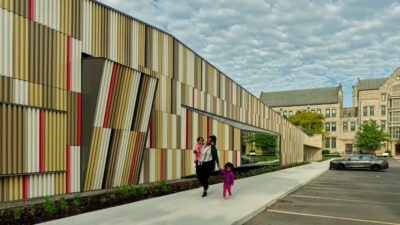This post is also available in: Español (Spanish) Kreyòl (Haitian Creole)
Donna Craig settled into a rocking chair and welcomed two toddlers onto her lap.
It was naptime in the Porcupine classroom at The Dreamery, a 24-hour childcare center located inside an affordable housing complex in the Edison neighborhood of Kalamazoo, Mich.
Craig, or “T.T. Donna” as the children call her, smiled brightly as she spoke to them in calming tones while they nestled into her arms.
Craig left a career in healthcare to pursue a passion for educating children, now working as an Early Learning Professional for the YWCA of Kalamazoo, which owns and operates The Dreamery. The transition was aided by an apprenticeship program that offers wraparound support to participants who are offered employment while they pursue a Child Development Associate (CDA) credential and earn credits toward an associate degree, allowing them to “earn-as-they-learn.”
“I came into this with my eyes wide open, knowing that I want to make a difference,” Craig said. “Since being here, I’ve made some very wonderful friends. And it’s an amazing, amazing opportunity… I just love what I do.”
Craig is among more than 30 individuals currently active in the Edison Early Childhood Education Career Pathway, a neighborhood-based talent development program aimed to fill workforce gaps in early childhood education, making careers in the field of early education more attainable.
The pilot program is part of a larger effort to reimagine early childcare in Michigan through innovative, collaborative and community-based approaches, funded through the Early Childhood Investment Corporation’s (ECIC) Child Care Innovation Fund.
Childcare in crisis
With rising costs to families, fewer employees and more than half the U.S. residing in a childcare desert, the COVID-19 pandemic exacerbated many of the challenges faced by the early childcare and education industry.
Dawne Bell, CEO of the Lansing-based Early Childhood Investment Corporation, said, “Out of crisis should come an opportunity.”
“So that’s where Child Care Innovation Fund comes in,” Bell continued. “Because we have these amazing demonstration projects happening across Michigan that are showing new ways of financing it, new ways of delivering it, really trying to get at some of those things that were broken before the pandemic and then just became compounded during the pandemic.”
The Child Care Innovation Fund was created by ECIC in 2021 following a $3 million seed investment from the W.K. Kellogg Foundation, part of the nonprofit’s $300 million social impact bond.
The fund works with public and private sector entrepreneurs to bring innovative solutions from other states to Michigan and test first-of-their-kind projects that seek common sense solutions to benefit working families, childcare business owners and early educators. The initial two years of the initiative were aimed at creating new, equitable business and financing models for early childhood providers to serve as a roadmap, ready to be taken to scale in Michigan.
“Our original goal was to support communities across Michigan, so that they could pilot some solutions, so that they could be creative on trying to figure out, ‘Well, this is our moment to try something different to solve childcare,’” Bell said. “I think there are some big things happening and all the innovations – big ways and small – are looking at the workforce issues and compensation issues, which is key, because we’re trying to apply pressure. Really, all of this will go to scale when we achieve policy change.”
Amid the pandemic, a 2021 survey of childcare providers by the Michigan Department of Education found that 86% of centers were unable to pay competitive wages. The median wage for childcare workers in the U.S. is $13.22 per hour, according to the U.S. Bureau of Labor and Statistics. In Michigan, it is $12.83 per hour, or $26,680 annually.
A new pathway
The Kalamazoo Edison Early Childhood Education Career Pathway was among the first recipients of funding through the Child Care Innovation Fund, with the Kalamazoo Literacy Council serving as its grantee.
The framework for the career pathway program targeted opportunity seekers who live in the Edison neighborhood, welcoming non-traditional candidates such as those who do not have a GED, who speak English as a second language or those who need additional guidance in navigating entry into the field of early childhood education.
“Our job is to find individuals that may not even know that early childhood education can be a career, because they have not been seen as a traditional candidate,” said Michael Evans, CEO of the Kalamazoo Literacy Council. “So, we are looking for those individuals, who if they were just given the support, to be able to get the credentials and get the experience that they might be able to leave a job that they can’t stand and join a career where they can actually make a difference and really change the trajectory of how they take care of themselves and their family.”
Over 180 individuals expressed interest in the pilot program, with 32 currently active in the career pathway program and an additional 43 prospective opportunity seekers.
Participants in the apprenticeship program were offered wraparound support, including literacy services, academic and basic skills, as well as non-academic supports such as housing assistance and on-the-job training in the early childhood education field. The program offers guaranteed full-time employment, with wages starting at $15 per hour, plus benefits. Part-time employment is also available.
“Participating in this opportunity actually is, from the beginning, lifting up the floor of the wages and helping to position people so that in the future, they’re able to go from strength to strength,” said Joan Blough, Senior Director for the Child Care Innovation Fund.
Based on the early success of the Edison Early Childhood Career Pathway program, ECIC is funding up to 10 additional communities across Michigan in 2023 to pilot an apprenticeship program to help solve their early care and education workforce challenges.
The public and private partnerships have continued to grow in communities across Michigan as the Child Care Innovation Fund has expanded its reach after receiving $12.5 million in federal American Rescue Plan Act funding, awarded by the Michigan Department of Education (MDE) through the Caring for MI Future initiative. An additional $2 million in federal funding was awarded in December of 2022 via Community Project Funding.
“We want to give our local communities a lot of credit here. I think they understand that there is no single solution to this,” Bell said. “We believe these early childhood issues are the top public policy issues for all families and for all residents in Michigan.
“We wouldn’t be so fervently working on this if we didn’t have hope and a plan that we’re going to move Michigan out of a crisis… It is a big win that we’re starting to talk about the space of early education as a public good. And we’re starting to talk about what would it really take to truly fund adequate compensation and truly fund options that meet all working family’s needs. And I think it’s not too long before we move from just talking and proposing ideas to seeing action.”
Kellogg Foundation invests in Michigan’s early learners through Child Care Innovation Fund
The COVID-19 pandemic magnified many longstanding issues in the field of early childcare and education.
An industry already in crisis saw many childcare employers close or dramatically scale back operations due largely to a shrinking pool of skilled early educators.
The W.K. Kellogg Foundation responded by acting boldly to help create a new roadmap for early childhood education in Michigan through a $3 million seed investment to the Lansing-based Early Childhood Investment Corporation for the creation of the Child Care Innovation Fund.
The two-year initiative works with public and private sector entrepreneurs to bring innovative solutions from other states to Michigan and test first-of-their-kind projects that seek common sense solutions that benefit working families, childcare business owners and early educators.
“We saw this as an opportunity to finally build the system we knew we always needed,” said Yazeed Moore, Senior Program Officer for the W.K. Kellogg Foundation. “We knew we needed to seize the moment to perhaps reimagine and rethink ways to build a stronger, more equitable system for early childhood care and education in funding as the existing system had been traditionally failing to meet the needs of children and families on so many fronts.”
The $3 million seed funding was part of the W.K. Kellogg Foundation’s $300 million social impact bond commitment, announced in October of 2020. The Early Childhood Innovation Fund aims to address low wages, compensation disparities and lack of advancement opportunities in the field of early care and education through integrated apprenticeship “pathway” programs that are unique to each community.
“We saw a tremendous response as historically, there had been little to no support to develop innovations among childcare providers and other would-be innovators in this space,” Moore said. “And anticipating new resources and future policy change at the federal level that would impact and benefit Michigan, and hopefully more positively, we wanted to be sure that Michigan over the next few years would be well positioned to inform and influence the conversations and developments in this space as we would be able to lift up community-level ideas and approaches of new business and financing models to reimagine childcare and bolster ECE funding in Michigan.”
Since the launch and implementation of the Child Care Innovation Fund, the E.C.I.C. has leveraged more than $14 million in federal funding for the initiative, expanding its reach and impact across Michigan.
Moore added that the fund serves as “an example of how philanthropy can partner with groups and communities to reimagine systems and approaches, a sort of rethinking, to what the world could be in our areas of content and focus areas like early care and education that best serve the lived experiences of the children and families we work on behalf each day.”
For more information, visit ecic4kids.org.
Watch Child Care Innovation Fund grantees share lessons learned on navigating Child Development Associate credentials & apprenticeships:
Communities supported through the Child Care Innovation Fund*
Antrim and Benzie Counties: Northwest Education Services. Pilot the use of direct wage supplementation for early educators at the onset of their formal education and build a model for the use of ongoing fiscal incentives, to engage, support, and retain early educators.
Calhoun County: Community Action South Central Michigan. Recruit and retain early childhood educators by offering support for formal education beyond the Child Development Associate, including assisting with barriers to completion.
Calhoun County, Battle Creek and Kalamazoo: Pulse at the W.E. Upjohn Institute for Employment Research. Pilot the use of a web-based menu of childcare options for employers that brings together corporate, economic development and early childhood resources.
Emmet County: North Central Michigan College. Conduct an innovation access and impact analysis with childcare businesses in Emmet County, to inform the development of resources to increase their uptake of high impact innovations for business sustainability and growth.
Grand Traverse, Leelanau, and Benzie Counties: United Way of Northwest Michigan. Scale out the Social Determinants of Health Community Connections Assessment, adding childcare and other early childhood services questions, and piloting with employers and health departments.
Kalamazoo County, City of Kalamazoo, Edison Neighborhood: Kalamazoo Literacy Council. Scale up a neighborhood-based early care and education career pathway which creates access to full-time, living wage jobs in childcare and offers childcare business incubation services.
Kent County, City of Grand Rapids: Steepletown Neighborhood Services. Scale up an early childhood educator registered apprenticeship program which combines academic instruction with on-the-job training, for which the apprentice is paid.
Leelanau County: Leelanau Early Childhood Development Commission. Scale up a county-based, shared services model to recruit, train, and support culturally and economically diverse adults to launch childcare businesses which provide infant/toddler and extended hours care.
Macomb, Oakland, and Wayne Counties: Focus: HOPE. Pilot on-the-job training and credentialing to adults who wish to pursue a career in early learning and provide low-to-no-cost childcare for families who do not qualify for subsidized childcare but are income restricted.
Missaukee and Wexford Counties: Alliance for Economic Success. Launch a childcare accelerator that capitalizes on existing community assets and engages new stakeholders to grow a vibrant, equitable childcare ecosystem.
Newaygo County: Newaygo County RESA. Pilot a county-based, childcare supply building hub that engages economic development and employers in providing business assistance to childcare business owners.
Ottawa County and City of Holland: Ottawa Area Intermediate School District. Iterate on an existing centralized enrollment and eligibility system to increase access to available preschool and childcare vacancies for families.
Washtenaw, Branch, Genessee, Hillsdale, Jackson, Lenawee, Livingston, and Monroe Counties: Childcare Network. Scale out the use of an Early Childhood Talent Coach to support early learning professionals to become credentialed and strengthen the culture and business practices of childcare workplaces.
Wayne County, City of Detroit, Cody Rouge Community: Development Centers. Pilot a community-based approach to childcare supply building, focusing on infant/toddler care and extended hours care and a provider designed transportation service that will bring young children from home to/from childcare and after care services safely and seamlessly.
25 Teams Impacting 16 Communities Statewide: Promising Ideas Incubator. In February 2022, ECIC prototyped and tested a Promising Ideas Incubator. The use of an incubator to assist entrepreneurs to generate strategic, viable innovation concepts is common in the business sector but, historically, there has been little to no support to develop innovations among childcare providers and other would-be innovators. ECIC’s Promising Ideas Incubator is a first-of-its-kind system level innovation for Michigan, specifically designed to generate the childcare innovations Michigan needs to powerfully impact the current childcare crisis.
*Source: 2022 ECIC Impact Report








Comments